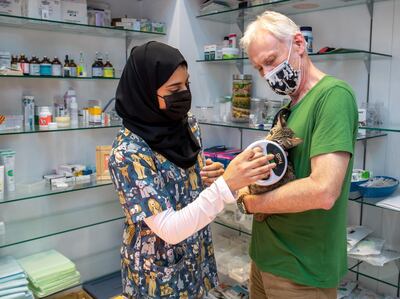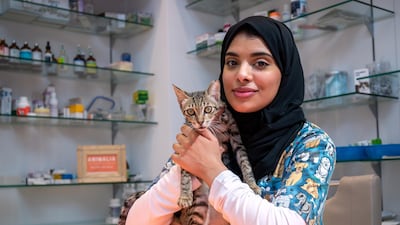A young Emirati woman is hoping to change attitudes towards animals by tapping into Bedouin values she says some people have lost sight of.
After graduating from UAE University in July, Dhabia AlQubaisi, 23, used her veterinary medicine degree to jump straight into volunteer work, caring for community animals and thousands of abandoned pets on the streets and construction sites of Abu Dhabi.
It is a much undervalued area of veterinary care, she said, one in which she hopes to improve attitudes to animals from some sections of society.
“When I graduated I wanted to help out in a clinic, especially in a community that helps stray cats because there is not much spotlight in that area,” she said.
“People are mainly concerned about pets or camels, rather than community animals.
“I wanted to do something different with my career to help these animals.”
Veterinary medicine was added to the roster of degrees available to study at UAE University in 2013.
The five-year course is the only one of its kind in the country and offers veterinary basic sciences education alongside intensive clinical training in specific animal species.
Dr AlQubaisi is from the second year of graduates to pursue a career in the field, and has gone down the less common route of helping volunteers with trap, neuter and release programmes.
“I recently helped out with an adoption programme and some of the cats now are going to forever homes. That is very rewarding,” she said.
“In the UAE, the rules regarding animal welfare have changed.
“By showing people we do care about this, especially community cats, may help spread more compassion towards the animals around them.”

Dr AlQubaisi said her upbringing and regular visits to her grandparents in Liwa to help with farm animals developed a strong bond with their welfare.
“I come from a Bedouin family that loves farm animals,” she said.
“Since I was a child, my father would take me to the farm to show how to care for them.
“It was special to interact with goats and camels, that has helped me develop a sense of loving towards them.
“It is part of my identity and something I am very proud of.
“The UAE is developing and some people have lost sight of the true Emirati life.
“Going back to that sort of life in Liwa brings me back down to Earth very quickly.”
Dr Al Qubaisi began her university course in 2015. She spent the final six months seconded to a veterinary clinic in Budapest, Hungary. She said the experience gave her a valuable insight into how animals are treated and cared for abroad.
She is now volunteering at the Animalia clinic in Al Bateen in Abu Dhabi.
Animalia provides a community backed model for animal welfare and helped to rescue about 100 cats living in the basement of three tower blocks at Mina Plaza before they were demolished in November.
Dr AlQubaisi said the project suggests a changing attitude to street cats.
“My observations while training in Budapest tell me the treatment of animals is perhaps more conscientious than it is here,” she said.
“That would be understandable since practising the veterinary profession has been ongoing for centuries in Europe.
“The quality of veterinary care here in the UAE is improving and as Emirati veterinarians we can have a major impact because there is room for growth.”
During the first three months in Budapest, students supervised small animal treatments in practice with different diagnostic methods.
The rest of the time was dedicated to learning about cattle and larger animals, such as horses.
“It was great to see how other countries work and treat their animals," she said.
“This helped me realise I wanted to work with smaller animal clinics, and one of the reasons why I wanted to volunteer at Animalia.
“I would like to have a positive effect on animals in the UAE through my career, especially community cats.
“Hopefully I can be a positive impact on locals too.
“I want to change the thinking of some Emiratis and encourage rules that support feeding stations and more TNR programmes for community cats.”


